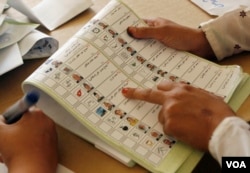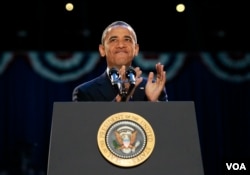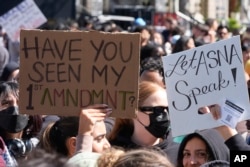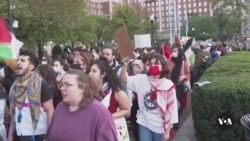Student Union
Finding Inspiration for Afghanistan in America's Election
Tufts: where more people watch the election than the Super Bowl twitter.com/mattmcd88/stat…
— Matt McDonald (@mattmcd88) November 7, 2012
Two weeks ago, I was standing among a throng of students in Hotung Café at Tufts University—a crowd burning in anticipation to learn the outcome of the presidential election.
I had left my quiet dorm room just ten minutes before with a friend of mine, after finishing my assignments, to witness this historic moment.
The area was packed; I could only cram into the room by jostling and shoving other students aside. The predictions for most of the eastern and southern states had already been announced; Governor Romney had a marginal lead over President Obama. After a while, the emcee announced that CNN’s prediction for Ohio, one of the key swing states, was out. Breaths were held, dead silence prevailed, and all eyes were fixed on the two TV screens.
***
In my mind I was transported back to the Afghan presidential elections in 2009.
The number of candidates was 22 times the number running in the American elections – 44 candidates – yet the thrill of the election was barely noticeable. In fact, I don’t even recall following the news about it. No matter how many candidates there were to choose from, there was little faith that any of them could or would bring much change.
Unlike in the U.S., the dominant political system in Afghanistan is one based on religious ideas and ethnic politics. This situation hinders even the most astute politicians from making much progress without bringing a complete revolution, an agenda that I believed none of the candidates promoted.
The U.S. presidential election had sparked many debates on campus over the issues of foreign and domestic policies. Many Tufts friends — both Republican and Democrat — constantly debated the varying issues. I too enjoyed enthusiastically engaging in discussions on American policies towards Middle East, China, or different regions in the world. At times I even dared to comment on the domestic policies of the two candidates. Passions on campus ran high.
In contrast, in 2009 most Afghans didn’t think their voices or votes mattered. The estimated voter turnout was a mere 30 to 35 percent. Many people in the rural areas were utterly oblivious to the elections, partly due to lack of media access and partly because the Afghan government plays no tangible role in their lives. Afghanistan may have been a “democracy” in structure, but due to the illiteracy and isolation of millions, a true democracy would be hard to establish.
***
“The 18 electoral votes from Ohio go to President Obama.”
The whole room exploded in exhilaration. “Obama, Obama, Obama,” the crowd roared, “Four more years, four more years, four more years.” I found that I also was standing there beside my American and international friends cheering for Obama.
Video from election night at Tufts University, by student Angela Sun
Tufts University Election Night Extravaganza 2012 from asun2013 on Vimeo.
I too was excited, but not because I truly embraced or even understood many of his domestic or international policies, or because I was against Governor Romney’s proposed strategies. I didn’t even agree with all of President Obama’s policies in the Middle East or Afghanistan. The reason was something more intimate.
The hope I felt was that one day I could be standing in a similar room in Afghanistan among the thunderous roar of people. People who were as equally excited about their own future.
America’s elections aren’t perfect, nor were its candidates. But I felt hope that one day Afghanistan could have candidates as capable and motivated as both President Obama and Governor Romney. I had hope for a leader who was not chosen due to ethnicity or religious sect, or who he was related to, but because of the potential he had for holding the office. I had hope that one day we too would have a free and fair election.
Afghanistan may have a long road ahead to tackle the issues of corruption and Taliban control, and to create the capacity for an authentic democracy, but for that one brief moment Obama’s victory rekindled my belief that anything was possible.
His victory speech wasn’t just to the American people, but to me and other Afghans of my generation.
When Obama challenged us to cherish “the spirit that has triumphed over war and depression; the spirit that has lifted this country from the depths of despair to the great heights of hope,” he gave me inspiration that we too could move forward. I identified with Obama’s messages, as they were the mottos I wished my countrymen held: hope, change, and moving forward.
Our hopes need not remain buried under the ruins of war by Kalashnikovs, tanks, and bomb explosions. We, too, could move forward. If we only believe we could.
See all News Updates of the Day
- By VOA News
Paper: International students faced extra pandemic challenges
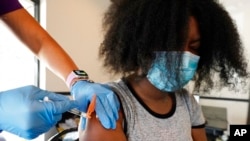
Astrobites, which describes itself as "a daily astrophysical literature journal written by graduate students in astronomy since 2010," focuses on the challenges international students faced during the COVID-19 pandemic.
It examines a paper published in the Journal of Comparative & International Higher Education entitled The Impact of the COVID-19 Pandemic on International Students in a Public University in the United States: Academic and Non-academic Challenges.
Read the Astrobites article here. (April 2024)
- By VOA News
15 cheapest US universities for international students
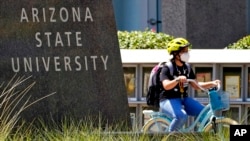
Yahoo!Finance has compiled a list of the 15 cheapest U.S. universities for international students.
Among them: Arizona State University, the University of North Carolina at Chapel Hill and Michigan State University.
Read the list here. (March 2024)
- By VOA News
Studying STEM? International students have funding options

US News & World Report takes a look at funding options for international students pursuing STEM degrees in the U.S.
The article explains the different kinds of scholarships and grants and offers tips on getting part-time jobs and private student loans. Read the full story here. (March 2024)
- By Robin Guess
US campuses are battlegrounds in free speech debate

This week the University of Southern California canceled the graduation speech of its senior class valedictorian at a time when there is a growing debate over the limits of free speech on American college campuses.
USC’s Asna Tabassum, a Muslim biomedical engineer major, was selected from among 100 outstanding students to address the graduating class of 2024 this May. However, the school withdrew the invitation for her to speak at the graduation ceremony citing safety concerns.
Tabassum denounced the decision, which she attributed to her public support for Palestinian human rights. She said it is part of “a campaign of hate meant to silence my voice.”
The school maintains it is a safety issue, not about free speech. School officials say they received an alarming number of violent threats after selecting her as speaker.
USC is one of many American universities that have struggled with policies over free speech and campus protest since October’s Hamas terrorist attack on Israel and the continuing fighting in Gaza. After weeks or months of on-campus protests and rallies, schools have been taking more forceful action to punish protesters who administrators say have become disruptive.
On Thursday at Columbia University in New York, police arrested more than 100 students who had gathered on campus for pro-Palestinian protests. The school’s dean wrote that the protesters had been told several times that they were violating university policies and would be suspended. The students say they were exercising their free speech rights.
At Washington’s American University, protests in all campus buildings have been banned by the school’s president since January. Under the new policy, students may not hold rallies, engage in silent protests or place posters in any campus building.
Protests and safety
University students have a long history of engaging in political activism. From the Vietnam War to abortion rights, universities have played a key role in American political debates.
However, students now say that schools like AU with a long-standing protest culture are silencing protesters with new rules.
Arusa Islam, American University student body president-elect and current vice president, says the policies are preventing an open discussion about U.S. foreign policy.
“Indoor protesting was never a problem, it was never an issue before October 7th,” Islam said. “Students were allowed to put up posters in buildings and students were allowed to have a silent protest.”
“And now we don’t have that right anymore,” she added. “We have been silenced and it is affecting us greatly.”
American University’s president, Sylvia Burwell, says the school’s new policies are intended to ensure that protests do not disrupt university activity.
Burwell also referred to recent events on campus that “made Jewish students feel unsafe and unwelcome.” She added, antisemitism is abhorrent, wrong, and will not be tolerated at American University.
While administrators insist that they are making narrow restrictions in the interests of providing an education, critics say the policies have a far-reaching effect.
At Cornell University, where new rules took effect in January, Claire Ting, the executive vice president of the Cornell Student Assembly, said the policies have had an unsettling effect on campus.
“The campus climate at Cornell has been tense surrounding free speech in recent times,” Ting emailed VOA.
Ting said that both students and faculty feel the policy has had chilling effects on free expression.
“Students report facing arbitrary, escalating punishment for violating the policy, with the policy itself lacking clear outlines for the consequences of civil disobedience,” she added.
In its new policy Cornell warns students that disciplinary action may be taken if protests impede people or traffic, damage school property or interfere with the school’s operations in any way.
In its campus-wide notice explaining the new guidelines, the school wrote that the new policy would ensure that expressive activity is allowed but must remain nonviolent.
The Foundation for Individual Rights in Education, also known as FIRE, has tracked free speech issues on American campuses.
FIRE and College Pulse have produced an annual survey, since 2022, ranking colleges based on their policies and what students say about the free speech climate on campus.
This year the group reported that “alarming” numbers of students say they self-censor or “find their administrations unclear” on free speech issues.
“College campuses have always been places where students have been unafraid to express themselves and with the recent Gaza conflict after the 10/7 attacks, it’s been very heated on both sides of this issue,” said Zach Greenberg, the senior program officer of FIRE.
Harvard ranked last in this year’s survey. FIRE said the school punished some professors and researchers over what they had said or written, and students reported a poor climate for free speech on campus.
The controversy came to Congress late last year, when Harvard’s president testified over complaints of widespread antisemitism.
“I don’t think you’d find many students on campus right now that would say we are the model for flourishing free speech and ideas exchange in the country,” said J. Sellers Hill, president of Harvard’s school newspaper The Harvard Crimson.
“But I think you’ve really seen that be acknowledged by administrators and it seems to be something they are dedicated to taking on.”
As the head of The Harvard Crimson, Hill manages the paper’s 350 editors and 90 reporters, who’ve covered, in detail, the ongoing free speech/protests controversy and the resignation of former President Claudine Gay following her testimony to Congress.
“I think no one would dispute Harvard has work to do and progress to make,” Hill said. “I think it’s a tough sell, for me, that Harvard is uniquely in its own league in terms of intolerance of speech. That doesn’t square with what I have seen on our college campus or on other college campuses around the country. I think Harvard is held to a higher standard.”
Proposed settlement offered over financial aid allegations
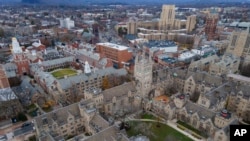
A group of U.S. colleges and universities have agreed to settle a lawsuit alleging deceptive financial aid tactics, according to a report published in The Hill.
The schools would pay $284 million to plaintiffs who were enrolled full-time and received financial aid between 2003 and 2024.
The schools have denied the allegations. (April 2024)




